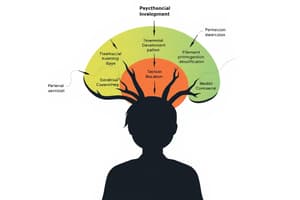Podcast
Questions and Answers
What does maturity refer to in psychology?
What does maturity refer to in psychology?
- The accumulation of knowledge over time.
- The physical growth of an individual.
- The state of being old and wise.
- The ability to deal effectively and resiliently with experience. (correct)
What is maturity built by?
What is maturity built by?
- Attitude
- Age
- Experience (correct)
- Knowledge
What should responsible decisions be based on?
What should responsible decisions be based on?
- Popular opinion
- Immediate gratification
- Personal feelings
- Social morals, ethics, and safety (correct)
What does the responsible decision-making model start with?
What does the responsible decision-making model start with?
Which of the following is a principle of ethics?
Which of the following is a principle of ethics?
What is one of the barriers to decision making?
What is one of the barriers to decision making?
What is the virtue developed during the Infancy stage, according to Erikson's stages of psychosocial development?
What is the virtue developed during the Infancy stage, according to Erikson's stages of psychosocial development?
According to Erikson, which psychosocial crisis occurs during the ages of 13-21 years?
According to Erikson, which psychosocial crisis occurs during the ages of 13-21 years?
What is an important aspect of making responsible decisions?
What is an important aspect of making responsible decisions?
What is the meaning of Beneficence?
What is the meaning of Beneficence?
What does implementation failures mean?
What does implementation failures mean?
In the responsible decision-making model, what is the step after identifying the problem?
In the responsible decision-making model, what is the step after identifying the problem?
Which principle of ethics involves treating others equally and fairly?
Which principle of ethics involves treating others equally and fairly?
What can too much stress lead to?
What can too much stress lead to?
What is 'Groupthink' defined as:
What is 'Groupthink' defined as:
What is the virtue developed from integrity vs despair?
What is the virtue developed from integrity vs despair?
What is the focus of the learning activity described?
What is the focus of the learning activity described?
If a student submits the learning assignment late, what is the penalty?
If a student submits the learning assignment late, what is the penalty?
Within the context of making responsible decisions, what does 'social morals' refer to?
Within the context of making responsible decisions, what does 'social morals' refer to?
Which of the following does 'Nonmaleficence' most closely relate to?
Which of the following does 'Nonmaleficence' most closely relate to?
What is one of the potential outcomes of prioritizing values over feelings?
What is one of the potential outcomes of prioritizing values over feelings?
Erikson's stage of 'Industry vs. Inferiority' most commonly occurs during which period?
Erikson's stage of 'Industry vs. Inferiority' most commonly occurs during which period?
Which of the following statements best reflects the relationship between maturity and age according to the quotes provided?
Which of the following statements best reflects the relationship between maturity and age according to the quotes provided?
Which of the following could be a negative consequence of 'groupthink' when making decisions?
Which of the following could be a negative consequence of 'groupthink' when making decisions?
Which task aligns with Autonomy?
Which task aligns with Autonomy?
Which of the following is maturity learning to do?
Which of the following is maturity learning to do?
Which of the following can threaten peace of mind, self-respect, values, and self-worth?
Which of the following can threaten peace of mind, self-respect, values, and self-worth?
Which of the following helps save time and energy??
Which of the following helps save time and energy??
What is a sign of act of maturity?
What is a sign of act of maturity?
What is the relationship between stress and good decision-making?
What is the relationship between stress and good decision-making?
Flashcards
Maturity (in Psychology)
Maturity (in Psychology)
Ability to deal effectively and resiliently with experience and perform satisfactorily in developmental tasks characteristic of one's age level.
Trust vs. Mistrust
Trust vs. Mistrust
The first stage; developing trust depends on the reliability of caregivers.
Autonomy vs. Shame/Doubt
Autonomy vs. Shame/Doubt
Focus is on developing a sense of personal control.
Initiative vs. Guilt
Initiative vs. Guilt
Signup and view all the flashcards
Industry vs. Inferiority
Industry vs. Inferiority
Signup and view all the flashcards
Identity vs. Confusion
Identity vs. Confusion
Signup and view all the flashcards
Intimacy vs. Isolation
Intimacy vs. Isolation
Signup and view all the flashcards
Generativity vs. Stagnation
Generativity vs. Stagnation
Signup and view all the flashcards
Integrity vs. Despair
Integrity vs. Despair
Signup and view all the flashcards
Responsible decisions
Responsible decisions
Signup and view all the flashcards
Ethical Decision-Making
Ethical Decision-Making
Signup and view all the flashcards
Impact Awareness
Impact Awareness
Signup and view all the flashcards
Community Benefit
Community Benefit
Signup and view all the flashcards
Decision-Making Model
Decision-Making Model
Signup and view all the flashcards
Autonomy (ethics)
Autonomy (ethics)
Signup and view all the flashcards
Beneficence (ethics)
Beneficence (ethics)
Signup and view all the flashcards
Nonmaleficence (ethics)
Nonmaleficence (ethics)
Signup and view all the flashcards
Justice (ethics)
Justice (ethics)
Signup and view all the flashcards
Stress
Stress
Signup and view all the flashcards
Information Overload
Information Overload
Signup and view all the flashcards
Groupthink
Groupthink
Signup and view all the flashcards
Preparedness
Preparedness
Signup and view all the flashcards
Implementation Failure
Implementation Failure
Signup and view all the flashcards
Study Notes
Maturity in Psychology
- Maturity is the ability to deal effectively and resiliently with experience.
- Maturity involves performing satisfactorily in developmental tasks.
- These tasks include biological, social, and cognitive aspects characteristic of one's age level.
Erikson's Stages of Psychosocial Development
- Infant to 18 months: Crisis is Trust vs. Mistrust; Virtue is Hope.
- 18 months to 3 years: Crisis is Autonomy vs. Shame/Doubt; Virtue is Will.
- 3-5 years: Crisis is Initiative vs. Guilt; Virtue is Purpose.
- 5-13 years: Crisis is Industry vs. Inferiority; Virtue is Competency.
- 13-21 years: Crisis is Identity vs. Confusion; Virtue is Fidelity.
- 21-39 years: Crisis is Intimacy vs. Isolation; Virtue is Love.
- 40-65 years: Crisis is Generativity vs. Stagnation; Virtue is Care.
- 65 and older: Crisis is Integrity vs. Despair; Virtue is Wisdom.
Key Insights on Maturity
- Self-knowledge is the initial step toward maturity.
- Maturity is an attitude shaped by experience, not just age.
- Maturity involves thinking, speaking, and acting with dignity.
- Maturity is learning to accept what you cannot change while courageously changing what you can.
- Understanding silence, rather than just speaking, signifies maturity.
- Avoiding petty arguments saves significant time and energy.
- Maturity includes walking away from situations and people that threaten one's peace, self-respect, values, and self-worth.
- Consistency and maturity are essential for success.
- Prioritizing values over feelings demonstrates maturity.
- Realizing self-improvement is more important than seeking validation.
- Maturity involves accepting life with its inherent tensions.
- Caring about people, things, and life is an act of maturity.
Making Responsible Decisions
- Involves the ability to make choices that positively affect the person physically, intellectually, socially, and emotionally.
- Is based on social morals, ethics, and safety.
- Requires awareness of the impact of one's choice on oneself, goals, relationships, and others.
- Benefits both the individual and the community.
The Responsible Decision-Making Model
- Identify the problem.
- Analyze the situation.
- Brainstorm solutions and resolve the issue.
- Consider ethical responsibility.
- Evaluate and reflect.
Principles of Ethics
- Autonomy: Acknowledge people's right to make choices for themselves based on their own values and beliefs.
- Beneficence: Act to prevent and remove harm, do and promote good.
- Nonmaleficence: Do no harm; avoid thwarting, defeating, or setting back someone’s interests.
- Justice: Treat others equally and fairly.
Barriers to Decision Making
- Stress: High levels of stress during crises can impair decision-making.
- Information Overload: Can reduce the number of individuals involved in the decision-making process.
- Groupthink: Occurs when consensus is prioritized over independent thought, which hinders creativity and novel problem-solving.
- Preparedness: Unfamiliar events lead to a greater requirement for change and increased stress.
- Implementation Failures: Lack of motivation, skills, understanding, or resources can cause implementation failures.
Learning Activity: Right Perspective
- Interview a registered nurse about an ethical issue prevalent in nursing practice.
- Analyze the ethical issue using a responsible decision-making process.
- Evaluate and reflect on the process of dealing with the ethical issue.
Studying That Suits You
Use AI to generate personalized quizzes and flashcards to suit your learning preferences.




